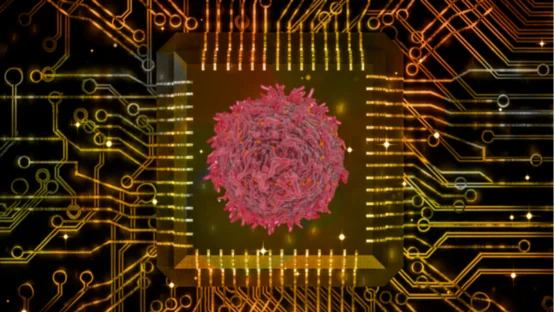Turn.bio has announced that its proprietary cellular reprogramming technology was able to significantly increase the proliferative and cytotoxic potential of premanufactured CAR-T cells in vitro.
Turn.bio, a developer of mRNA-based cellular reprogramming technologies, has announced preliminary results from its current trial. The announcement was made by the company’s co-founder, Prof. Vittorio Sebastiano, at the New Frontiers of RNA Nanotherapeutics conference at Houston Methodist Research Institute. These results show that the company’s proprietary Epigenetic Reprogramming of Aging (ERA) technology greatly increases the fitness of CAR-T cells, which are widely used in modern immunotherapy.
T cell exhaustion is a big problem
CAR stands for “chimeric antigen receptor”, and CAR-T cells are genetically engineered to be able to bypass cancer cells’ anti-immune defenses. However, according to Sebastiano, “the primary bottleneck that’s crippling CAR-T immunotherapy is that due to the manufacturing process and the toxicity of the tumor microenvironment in vivo, the cells experience exhaustion.” This exhaustion leads to decreased viability and proliferation and greatly impairs T cells’ anti-cancer potential.
There is also an aging component: CAR-T cells are usually manufactured from the patients’ own T cells, and aged patients have aged T cells with already decreased function [1].
The third major reason for T cell exhaustion is anti-cancer therapies themselves. Currently, CAR-T therapy is used as the last line of defense if chemo and other more traditional approaches have all failed. However, those are extremely taxing on many biological functions. According to recent research, anti-cancer therapies actually exacerbate aging [2], and T cells are not spared.
Rejuvenated by reprogramming
This is where Turn’s rejuvenation technology should be able to help. According to Sebastiano, “ERA goes beyond aging; it can potentially treat any aging-like phenomena.”
ERA is based on Turn’s proprietary cocktail of reprogramming factors delivered via mRNA. It has been designed with control and customization in mind, allowing for precise reprogramming depending on cell type, disease, and other factors. This allows for cellular rejuvenation without an unwanted return to pluripotency, overcoming a significant hurdle in a technology that Turn has been perfecting for years.
ERA is aided by eTurna, Turn’s delivery system that uses proprietary Turn Lipid Particles (TLPs). Turn has been screening lipids to achieve high efficiency and cell type specificity, both in vivo and ex vivo. Turn envisions eTurna as an alternative to electroporation – the current method of choice for delivering cargo to T cells, which involves applying weak electric current to make cellular membranes more permeable. Electroporation is damaging to cells [3] and, according to Turn, constitutes yet another aging-like factor.
This trial still uses electroporation to deliver ERA factors to premanufactured CAR-T cells. However, Sebastiano is confident that using eTurna for the same purpose will prove superior. “The combination of eTurna and ERA”, he said, “should result in an even bigger effect, due to lower toxicity.” Trials that use eTurna as a delivery system are already underway, and according to preliminary data, eTurna is indeed as good as electroporation in delivery efficiency while also being less cytotoxic.
“In the current study”, said Sebastiano, “we, as usual, saw a much larger effect in older donors than in younger ones.” However, even in younger donors, rejuvenation of CAR-T cells by ERA increased their proliferative and cytotoxic potential two- to threefold. While some additional variability was observed in older donors, the increase in T cell function in this group was up to fivefold.
The dawn of a new ERA?
“The obvious next step is to combine eTurna and ERA,” said Sebastiano. “Another goal is to find the minimal amount of reprogramming factors needed to induce this rejuvenated phenotype that we’re seeing – the smallest but equally potent cocktail out of the six factors we’re using right now.”
The current study is being done in vitro on some run-of-the-mill cancer cell lines, so the third direction that Turn is pursuing is in vivo studies in which CAR-T cells rejuvenated by ERA are pitted against actual tumors. Those studies are already underway as well, and, according to Sebastiano, we can expect early data in six to eight months.
We encourage our readers to check out this extensive interview with Prof. Sebastiano, where we touch upon various topics related to cellular reprogramming, one of the hottest emerging technologies in the longevity field.
Literature
[1] P Chou, J., & B Effros, R. (2013). T cell replicative senescence in human aging. Current pharmaceutical design, 19(9), 1680-1698.
[2] Wang, S., Prizment, A., Thyagarajan, B., & Blaes, A. (2021). Cancer treatment-induced accelerated aging in cancer survivors: biology and assessment. Cancers, 13(3), 427.
[3] Napotnik, T. B., Polajžer, T., & Miklavčič, D. (2021). Cell death due to electroporation–a review. Bioelectrochemistry, 141, 107871.




